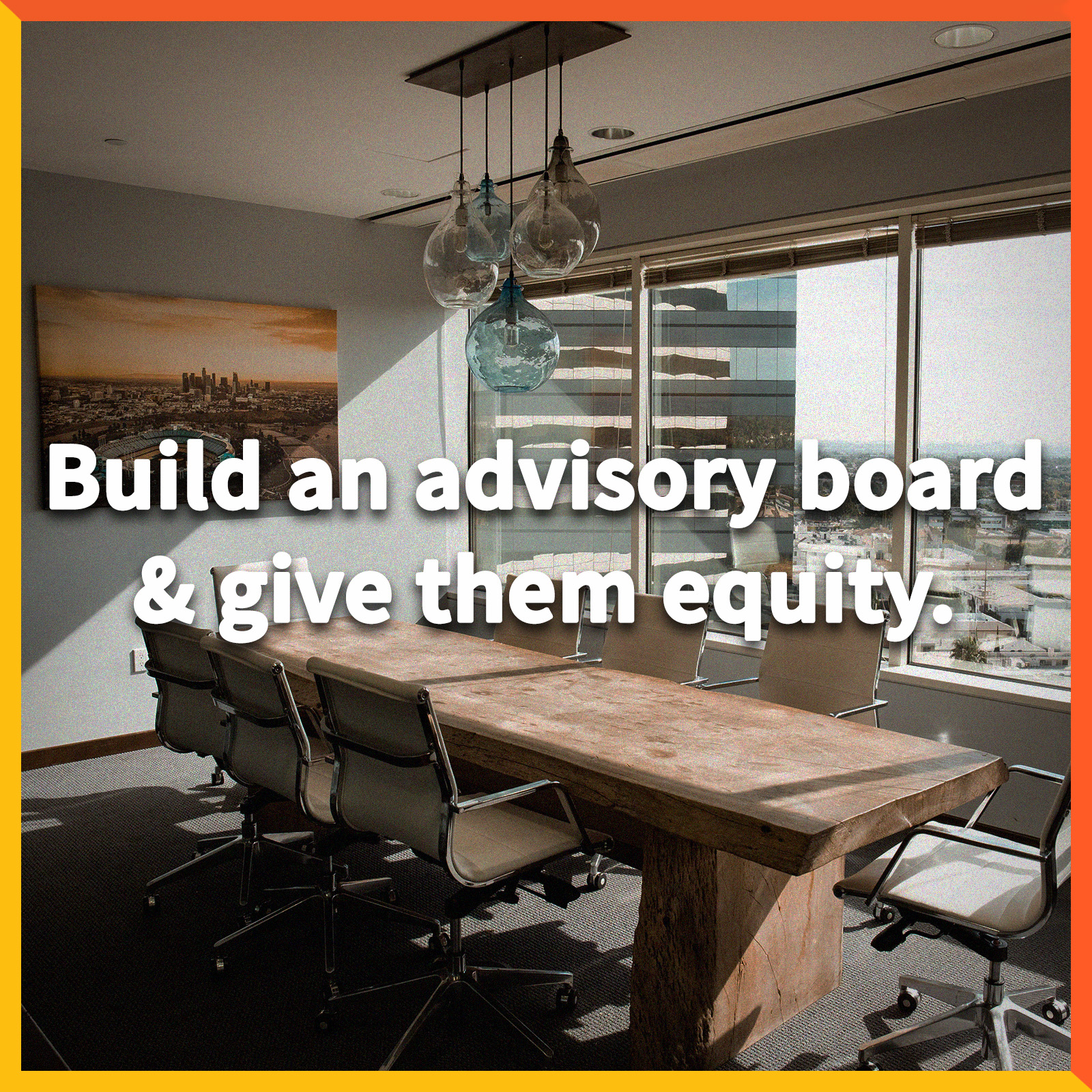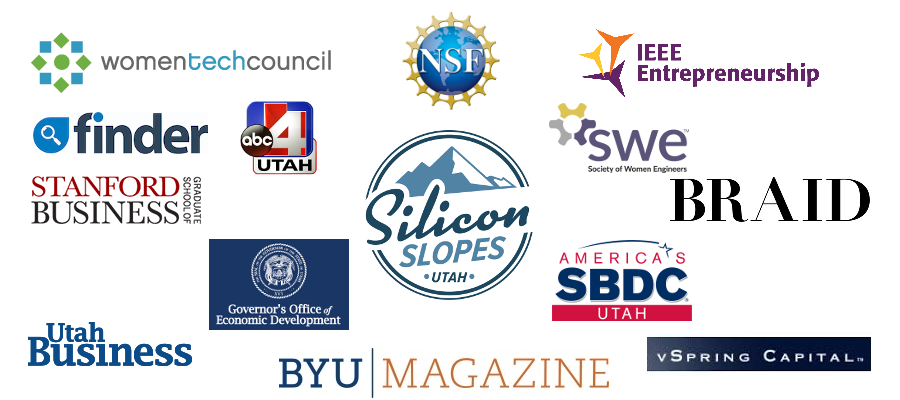You’ve read some of my thoughts on How a Board Can Support Founder & CEO Success. Those thoughts are mostly focused on a Board of Directors. But I also wa nt to champion a Board of Advisors or simply Advisory Board. What’s different? Advisors do just that, they advise. They are not fiduciaries (which takes pressure and liability off of them and off of you), but since you are going to give them equity, they have your best interests at heart.
nt to champion a Board of Advisors or simply Advisory Board. What’s different? Advisors do just that, they advise. They are not fiduciaries (which takes pressure and liability off of them and off of you), but since you are going to give them equity, they have your best interests at heart.
An Advisory Board is a group of people whose advice you value and are interested in listening to, and who you think can help or assist you on your entrepreneurial journey. Now they are not “yes people” or people who will always tell you how smart you are! And you don’t want people who will always be telling you how smart THEY are (and there are plenty of THOSE people out there!).
The best Advisors are people who believe in what you are doing, and who believe in you and who also believe they can help you. I don’t accept invitations to sit on advisory boards unless I believe in the vision and the team. And I also don’t sit on Advisory Boards unless I think I can help. I am always willing to be candid if I don’t think my experience is relevant or is what the company needs.
Recently I agreed to sit on a new advisory board. This company was introduced to me by an entrepreneur support organization, and I mentioned to that individual who had introduced me that I’d agreed to be an advisor to this very young company. The comment back to me was “So you think there is value there”. I said, emphatically, Yes!
Enhancing your Company’s Credibility is one of the benefits of having an Advisory Board.
By convincing a handful of talented and experienced people that you are credible and capable and there is “value there”, you now have advocates telling your story and lending you credibility. And because your Advisory Board receives regular updates from you on a regular basis, they can say that with confidence.
How Big should your Advisory Board be?
There’s no hard and fast rule, and it depends upon how you want to work with your Advisors – primarily one on one or as a group in regular meetings. A handful, 3 or 4, is probably the most you can develop strong working relationship with. Be thoughtful about the value you want your Advisory Board Members to bring – industry expertise, entrepreneurial experience, functional expertise etc.
How do you compensative your Advisory Board?
The most common compensation for Advisory Board Members for startups and young companies is equity. This is a small equity grant and frequently vests over 1-3 years. An alternative is a cash payment, perhaps $500-$1500 per Board meeting, for example. But frankly, for cash strapped startups, equity is much more common!
So, how much? The most common Advisory Board equity grants I’ve seen and that are commonly referred to are grants between 0.25% and 1% of shares. Vesting shares protects the company and the advisor. A six month cliff vest, followed by monthly vesting allows everyone time to test out the relationship and fit with little risk in either direction. Alternately of course vesting could be regular, such as quarterly. Note that annual vesting is probably too long for Advisors as you will likely update your Advisory Board as the company grows and your needs change.
Should you have some legal documentation for your Advisory Board?
Well, if you’ve paid any attention, the answer here is OF COURSE! If it’s not in writing, it’s not real. Some suggested inclusions are:
- Highlighting the responsibilities and focus of the Advisor
- Protections for confidential and proprietary IP and information (similar to your NDA agreement)
- Term of the agreement and extension terms if any
- Compensation amounts and vesting, as appropriate.
To Meet (all together) or Not to Meet?
Be sure to have a conversation with your Advisors to establish the ways you will interact. If you have formal meetings, consider several meetings per year (but monthly is much too often!) However, some entrepreneurs might prefer to meet one on one, or on an ad hoc basis with Advisors, depending upon the business needs.
One key question is the amount of time you should expect from your Advisor. This can range from 1-2 hours a month up to 4-5 hours per month. The important element is whether you can read that Advisor when you need them!
What are some “long term” or “big picture” questions should I ask my Advisory Board?
Sometimes these are the same questions you ask a Board of Directors. Sometimes it is specific help on a specific issue you are having in the business. Here are some suggested questions that can be asked of both a Board of Directors and an Advisory Board
-
-
- What are the biggest risks “out there” they’re watching that they think you should be watching?
- Are there problems that they think you (management team) are ignoring or haven’t thought of?
- Are there any issues the management team is working on that Board members think are more urgent than management does?
- What needs to be discussed that isn’t being addressed? (Note, good advice I received “Look Reality Square in the Eyes!”)
- Management Team: Are you getting the right people on the bus and the wrong people off the bus? Are there areas of weakness in the management team that need to be addressed?
- Where is potential white space the management team may be overlooking?
- How is the world changing in ways that may affect the business?
- Are there other strategic opportunities the company should be considering? Are there strategic initiatives that the Board does not see bearing fruit and that should be re-evaluated?
- Where are other company blind spots?
- Are there regulatory or other legal changes or issues that are emerging that can affect the business?
-
 If you want more in depth help, either a proposal review or help developing your proposal, you can apply for a spot in our one-on-one VentureWrench SBIR Coaching after you’ve gone through the course. Email us at venturewrenchcommunity [at] gmail.com with questions.
If you want more in depth help, either a proposal review or help developing your proposal, you can apply for a spot in our one-on-one VentureWrench SBIR Coaching after you’ve gone through the course. Email us at venturewrenchcommunity [at] gmail.com with questions.
And if you need help with any part of your SBIR process – proposal (Phase I or II), TABA, proposal management, or contract finalization, just email us at venturewrenchcommunity [at] gmail.com with questions.
Don’t forget, if you need more help, check out our online course, Develop a Winning SBIR Strategy, and don’t forget your free guide below!

